John Janaro's Blog, page 29
July 3, 2024
St Thomas the Apostle and the Reality of the Risen Jesus
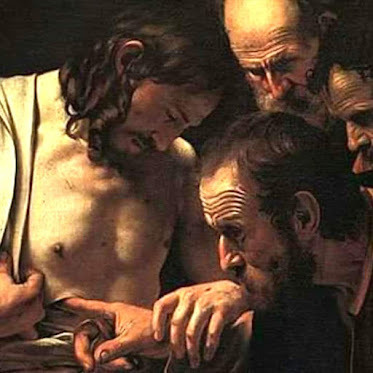 Today we celebrate Saint Thomas the Apostle.
Today we celebrate Saint Thomas the Apostle.The Gospel tells us that the risen Jesus said to 'Doubting Thomas': “Put your finger here and see my hands, and bring your hand and put it into my side, and do not be unbelieving, but believe” (John 20:27).
Caravaggio's famous 1602 painting The Incredulity of Saint Thomas assures us that Jesus was speaking literally... for some people it "assures them" to the point of making them uncomfortable. Nevertheless, the jolting realism of Caravaggio has a point, and maybe we're right to feel "discomfort" in one sense. Ultimately, real Christianity is "uncomfortable" because it's not a collection of stories and ideas and rules that we can finally master and control by our own power (though people always try). Real Christianity is a Person; real Christianity is A MAN, a particular man from a particular place and time, a real man of flesh and blood and bones, of spirit and intelligence and freedom—a man who says of himself: "I AM the way and the truth and the life" (John 14:6).
Real Christianity is the Word who became flesh to dwell with us; God the Infinite Mystery, the Source of all things, for whom the depths of our hearts yearn—whom we long to know and love—but who is always beyond our power, who cannot be grasped, to whom we cry out for a fulfillment we seek without being able to understand it: the Infinite became a man so that he could be with us as our brother, so that he could save us and bring us to a fulfillment beyond anything we could imagine.
The Mystery became flesh so that as a man he could enter human history and heal and transform it "from the inside," through his human life, death, and resurrection that initiate a New Creation beginning with his risen humanity. Still he remains a real man (Thomas is invited to verify this with his fingers that touch the transformed but still "open" wounds in his now-immortal but still human flesh). Through his humanity we are called to become “partakers of the divine nature” (2 Peter 1:4) in communion with the Triune God forever.
This man, Jesus of Nazareth, is deeply involved in every person's life whether they know it or not. He calls us to a relationship with him. He is all wise, all good, entirely trustworthy and (if I may put it this way) madly in love with each one of us, with our particular humanity, our flesh and blood, our soul, our reason, our freedom. He loves me, he loves you right now, even if our lives are totally messed up, even if we've done terrible things, even if we have been running away from him.
He calls us to a real relationship, which is going to be mysterious and difficult and better than anything we could ever do alone: it is an adventure in which we are not the ones who are "in control" (even as it engages all our intelligence, creativity, co-operation, and responsibility). "Blessed are they who have not seen, but still believe" (John 20:29).
Believers are called "blessed" by Jesus. They are not called "comfortable." Living a relationship with Jesus Christ takes us way outside our boxes and way beyond our comfort zones. It's a "love story," after all. It corresponds to all our hopes, while also exceeding any kind of hope that we can measure. It promises and even now "begins" to fulfill all of our desires for life and love, while also "overflowing" them, because in Jesus God gives us Himself.
Jesus never said "Do not be uncomfortable." He said, "Do not be afraid" (see e.g. Matthew 14:27, Luke 5:10, John 14:27). Do not be afraid. Trust in Jesus Christ, always!
July 2, 2024
Remembering Mom Three Years Later
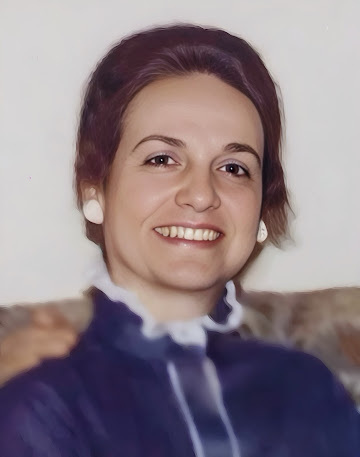 July 3rd is the third anniversary of the death of my mother, Joan M. Janaro (December 29, 1938-July 3, 2021). Here's a picture of Mom, sometime in the late 1970s-early 1980s. May the Lord grant her eternal glory.
July 3rd is the third anniversary of the death of my mother, Joan M. Janaro (December 29, 1938-July 3, 2021). Here's a picture of Mom, sometime in the late 1970s-early 1980s. May the Lord grant her eternal glory. I will share here a few words I would like to say to my mother, in my heart: "Dear Mom, I miss you. I pray for you and think of you every day (often). I have only begun to realize how much you have given to me since the beginning, to Eileen and I in our marriage, to our family, your grandchildren, and even your great-granddaughters who didn't get to meet you in this earthly life. It never seems like you're very ‘far away,’ especially when the family gets together. Thank you for everything, Mom. I love you!"
June 30, 2024
Christina Grimmie: Instrument of Christ's Love
[The Christina Grimmie Foundation and the people of “Team Grimmie” all over the world have been celebrating Christina Grimmie’s life and legacy in a special way during this month of June. On the last day of June, I thought it would be fitting to finish these reflections on Christina’s faith, which we all know was fundamental to her identity. I know that many Team Grimmie frands are not Christians, but I hope they will recognize this essay as my own effort—as a Catholic Christian—to appreciate the significance of her faith in Christ in light of my own faith. For my friends who aren’t Christian, this text represents my effort in an ongoing dialogue in which we can all grow in a greater mutual understanding of what we have learned about life from a multitude of diverse traditions, our own seeking of life’s meaning, and the ways in which Christina’s bright brief beautiful life has inspired our humanity. I am a man of many words, but I am also a good listener, and I have learned much from all of you. I offer these words humbly and with great esteem for each one of you. And, of course, above all “with love.” ~JJ ]
 "
Jesus loves you so so much!... As do I
" (Christina Grimmie).
"
Jesus loves you so so much!... As do I
" (Christina Grimmie).Christina still helps us to remember that Jesus loves us... Her witness was not only in words but also in her own love, her own embrace of others, her own willingness-to-give-herself in love to persons near and far. She saw herself as His instrument (as, for example, when she said in 2014 that her voice ‘belonged to Jesus,’ and that she intended to use it “for His glory”).
Christina didn’t put on a big show of “being religious,” but her faith in Jesus Christ was central to everything she did. She once said on a YouNow livestream, “my faith is not just a part of my life; my faith is my life.” Thus, her faith—her commitment to Jesus, her trust in Jesus, her “belonging to Jesus”—was organically united to her way of experiencing life, and especially to her giving and receiving love. Jesus was “within” all her relationships, and He empowered her to look at each person particularly, to listen to and encourage and affirm the dignity of every person. Christina wanted to be an instrument of the “glory”of Jesus. His “glory” is His infinite love, His total giving-of-Himself to redeem, heal, and transform every person and bring them to live forever in God’s love. Jesus is the only One whose love saves us, and Christina knew that. As His disciple, she saw her particular vocation not as preaching with words, but—as a musician—to witness to His love through the gift of her music and the relationships with others that emerged from it in various ways.
Of course, her particular commitment to Jesus did not guarantee that she would always act in complete coherence with her vocation. She undoubtedly had her share of misjudgments, mistakes, fatigue, distraction, and sins such as we all commit even as we seek to follow the Lord. It takes time to grow in conformity to Christ’s love. Everything that we know, however, seems to indicate that Christina consistently returned from failures and continued to grow in the scope and depth of her gift-of-herself to Christ. She grew in her capacity to witness to and communicate His love as He filled her life, and made her service more spontaneous —which in a personal sense means not more “automatic” but more free.
 Christina let Jesus work through her by the gifts He had entrusted to her as an “instrument” of “His glory (Love).” Thus, His love could become, in a profound sense, "present" to people through their experiencing her love: "Jesus loves you, AS DO I" —thus she witnessed to His love by giving herself... right up to the last gesture of the last moment of her life.
Christina let Jesus work through her by the gifts He had entrusted to her as an “instrument” of “His glory (Love).” Thus, His love could become, in a profound sense, "present" to people through their experiencing her love: "Jesus loves you, AS DO I" —thus she witnessed to His love by giving herself... right up to the last gesture of the last moment of her life. Christina did not walk around with that kind of “dour face” that some people who regard themselves as “religious” seem to have all the time. She was openly, ardently Christian, but there was something different about her—she had a kind of freedom which definitely did not neglect her Christian morals, but also didn’t seem “constrained” by them. On the contrary, her fidelity to Jesus seemed to “open her up” more radically to the fundamental goodness of reality as redeemed by Him. She lived that exhortation of Saint Paul: “All things are yours, and you are Christ’s, and Christ is God’s” (1 Corinthians 3:22-23).
Christina was not afraid of life. On the contrary, she plunged into life with gusto, always seeking the good—great goods, certainly, but also the “ordinary goods” that are a daily part of life for the average 21st century teenager or young adult. She as very much a regular kid—someone her peers could relate to—who had crushes and boyfriends and heartbreak, who liked to have fun, play video games, eat pizza and ice cream, joke around with her friends, laugh a lot, watch movies and television, text and goof around on social media, and listen to many kinds of contemporary music. Yet she didn’t “lose herself” in her adolescent enthusiasms, but engaged these interests within the context of “something greater” that grounded her sense of self-worth (as a teen, she once described her three main interests—in a tongue-in-cheek but ultimately serious way—as “food, music, and video games… all united and raised up in Jesus.”
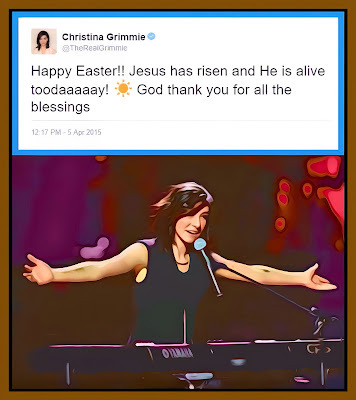 From the very beginning of her career on YouTube, she made it clear in her description of herself that “Jesus is my Savior and I love Him and sing for Him.” But her love for Jesus was not ponderous or constraining, nor was it an extrinsic “agenda” of prosylitism artificially shaping her activities. Rather, her love for Jesus pervaded her life in a way that was sustaining and liberating, like a flame that illuminated her whole humanity—that made her more relatable, more “familiar,” more genuine, more human—but also “different,” like something breaking through her whole personality that was “new” and attractive, striking and unpredictable, surprising and wonderful. Christina generated an environment through her presence on YouTube that was welcoming, gentle, and congenial. She shared therein her amazing voice and her passionate dedication to her music. This was enough to attract a following, but at a certain point, Christina’s growing YouTube fan base found themselves drawn to more than just the great music. They (we) were inspired and drawn by her extraordinary passion for life.
From the very beginning of her career on YouTube, she made it clear in her description of herself that “Jesus is my Savior and I love Him and sing for Him.” But her love for Jesus was not ponderous or constraining, nor was it an extrinsic “agenda” of prosylitism artificially shaping her activities. Rather, her love for Jesus pervaded her life in a way that was sustaining and liberating, like a flame that illuminated her whole humanity—that made her more relatable, more “familiar,” more genuine, more human—but also “different,” like something breaking through her whole personality that was “new” and attractive, striking and unpredictable, surprising and wonderful. Christina generated an environment through her presence on YouTube that was welcoming, gentle, and congenial. She shared therein her amazing voice and her passionate dedication to her music. This was enough to attract a following, but at a certain point, Christina’s growing YouTube fan base found themselves drawn to more than just the great music. They (we) were inspired and drawn by her extraordinary passion for life.It was not an easy life. Christina didn’t hide the immense difficulties and struggles that she and her family faced. Her mother battled cancer for over two decades, and her family had many trials. She loved her family, and they accompanied her and supported her in her music career and her mission to give glory to Christ and love people through music and the great openness to those she called her “frands” (friend-fans), who were drawn to the space generated by her unique “hospitality.” People all over the world—people from diverse cultures, traditions, religions, and ways of thinking—were drawn together into “Team Grimmie,” a group that was, and continues to be, so much more than an ordinary “fandom.” Christina gave her love, and—with her awareness and desire to recognize the good in others—she rejoiced in their gifts, their support, their love for her.
 Christina also sought out the good in people and places that are “on the margins”—complicated people, sick people, misunderstood people, confused people, troubled people. They all knew that she was a Christian—and many of them weren’t, but they never felt “condemned” by her. They knew she loved them, unconditionally, but not in a vague fuzzy merely sentimental way. She loved them in a way that “moved them,” provoked them, woke something up inside of them. Experiencing her love made them (and all of us) want to go forward on the journey of our lives, to take the “next step” that was calling us—notwithstanding the risk it entailed—to act to go deeper into the goodness of reality that was in front of us, to say “yes” to the challenges that we faced with confidence. Adam Levine (from Maroon 5), who was her coach on The Voice, said, “when I’m with Christina, I want to be a better person.”
Christina also sought out the good in people and places that are “on the margins”—complicated people, sick people, misunderstood people, confused people, troubled people. They all knew that she was a Christian—and many of them weren’t, but they never felt “condemned” by her. They knew she loved them, unconditionally, but not in a vague fuzzy merely sentimental way. She loved them in a way that “moved them,” provoked them, woke something up inside of them. Experiencing her love made them (and all of us) want to go forward on the journey of our lives, to take the “next step” that was calling us—notwithstanding the risk it entailed—to act to go deeper into the goodness of reality that was in front of us, to say “yes” to the challenges that we faced with confidence. Adam Levine (from Maroon 5), who was her coach on The Voice, said, “when I’m with Christina, I want to be a better person.”She gave us courage. She still does.
Christina lived “in the world” with a heart full of the love of Christ, and therefore a love of every person in whatever difficulties or afflictions, a love for actual persons, a love for the person who was in front of her at any moment... without conditions. She belonged to Jesus, and this was her greatness.
This was her heroism.
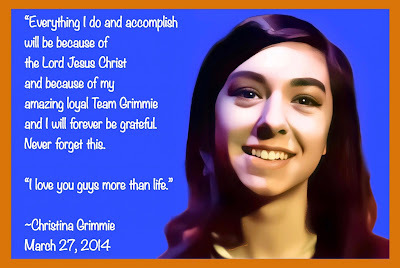 I don’t think she was naive or careless. She knew the risks of love, and through Christ she willingly embraced them. She lived her life for Him, believing in Him, trusting Him. Empowered by His Spirit, her whole life became a great embrace, offered through her heart, that excluded no one. Such a love is not merely superficial and sentimental; it bears within itself the readiness to face opposition and danger, and even to make the ultimate risk. Her faith in Jesus made it possible for her to live this way, to risk being human in front of every person, in all the circumstances in life.
I don’t think she was naive or careless. She knew the risks of love, and through Christ she willingly embraced them. She lived her life for Him, believing in Him, trusting Him. Empowered by His Spirit, her whole life became a great embrace, offered through her heart, that excluded no one. Such a love is not merely superficial and sentimental; it bears within itself the readiness to face opposition and danger, and even to make the ultimate risk. Her faith in Jesus made it possible for her to live this way, to risk being human in front of every person, in all the circumstances in life. I think that in her heart she had offered her life for Christ, to be an instrument of His love, long before the night of June 10, 2016. On that night, she stretched out her arms to make a space of love for one more person. She was following her Lord, as she had made a habit of doing in her life—living and growing in faith, no doubt making mistakes, sometimes growing tired or distracted, but moving forward, seeking forgiveness, growing ever closer to Him. She knew the path that her Savior walked, with love, for her redemption and the redemption of the world. She knew that that He died with His arms stretched open with love for everyone. She also knew that this love conquered death. Love won the victory over death.

This is why people "still feel that she loves them"—even people who only discover her after her death. Her love continues to shine, to be personal even now, to inspire us and help us, because she lives now in the glory of Jesus Christ. In union with God through Christ, she has not forgotten any of us and she knows and loves the "newer frands" too, the ones who continue to discover her on YouTube, to hear her voice for the first time, to encounter her person and her unique form of witness even now, eight years later.
"Jesus loves you... as do I" —she witnessed to His love with her own love, with her whole life, all the way to her last moment on this earth, opening her arms to "welcome a stranger." I thank God for empowering Christina to give herself with such great love, a gift that has touched our lives in ways deeper than we know.
June 29, 2024
June 29, 1996: The “Honeymooners” in Rome
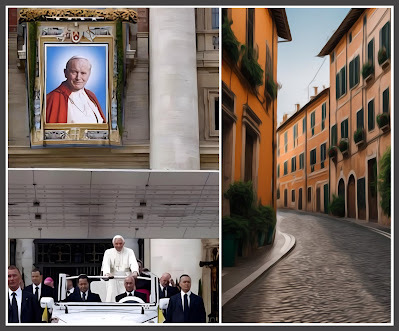 June ends beautifully, with the great Solemnity of Saints Peter and Paul. This always leads me to reminisce about the Eternal City. As I've said before here, Eileen and I are both "Romans" by virtue of the (different) times we each lived and studied there in our youth, and by our great excursion together at the beginning of our married life. We spent three and a half weeks in Italy for our "honeymoon" back in 1996. We were able to make this trip because we didn't seek a "lovers' solitude" experience; we spent all but five nights at the homes of friends. It was a real trek, from Rome to Assisi to Florence to Ravenna to Milan to the Italian Riviera. I'm so glad we did it then, when we had the time and the energy of our youth. I'm glad that, while we were still able, we rode trains and buses, slept on floors or (worse) the infamous Italian "letto," and hauled bags that got bigger and bigger as we accumulated loot along the way!
June ends beautifully, with the great Solemnity of Saints Peter and Paul. This always leads me to reminisce about the Eternal City. As I've said before here, Eileen and I are both "Romans" by virtue of the (different) times we each lived and studied there in our youth, and by our great excursion together at the beginning of our married life. We spent three and a half weeks in Italy for our "honeymoon" back in 1996. We were able to make this trip because we didn't seek a "lovers' solitude" experience; we spent all but five nights at the homes of friends. It was a real trek, from Rome to Assisi to Florence to Ravenna to Milan to the Italian Riviera. I'm so glad we did it then, when we had the time and the energy of our youth. I'm glad that, while we were still able, we rode trains and buses, slept on floors or (worse) the infamous Italian "letto," and hauled bags that got bigger and bigger as we accumulated loot along the way! I recommend this kind of honeymoon for you young folks, especially if you are humanities buffs like us. Trust me, you will never be able to throw yourselves about with such freedom as in these early days of marriage. Soon come the babies, and the kids, and before they grow up your bodies will have slowed down, and you will have settled expectations and habits, as well as tricky joints and bad backs and arthritis. Many older people still travel with gusto, but that sheer energy and “flexibility,” that spontaneity and lack of preoccupation with agendas or plans are qualities that are strongest when you are young.
Youth is the time to explore, to rough it, to embark on physically arduous adventures, especially with your spouse. Go somewhere beautiful and fascinating, full of human history and aesthetic richness. Or go on pilgrimage to the places where God's love has touched the world. You will build a foundation of common experience that will stay with you forever.
In Rome we spent a week and a half at an apartment not far from the Vatican, with a friend's mother. This lovely old woman cleared a room for us, made coffee for us every morning, and often fed us abundantly in the kitchen at night (even if we had already eaten). I have never found a restaurant that can match the culinary magic that happens in the simple Italian kitchen. Oh, my my!
We went to all our favorite spots in Rome and shared them together. We brought our newly married life to the tomb of St. Peter, and prayed a long time. We explored churches and ruins and great art. June 29th sticks in my mind because we went to St Peter's basilica for the ceremony in which the Pope (then Saint John Paul II) invests new Archbishops with the pallium, a woolen band worn as a sign of their particular responsibility and their communion with the Pope.
It was a beautiful ceremony, very crowded of course, so that we barely had a glimpse of the Pope. (We had no idea, at that time, that we were going to meet him in a few days!) Afterwards, in the midst of the crowds, we bumped into a little bishop from Malaysia—whose name I do not remember—and struck up a conversation with him. He was the first bishop to bless our marriage.
I wonder where he is today. He may well have gone home to the Lord by now. We never did get his name.
Among many things, Rome is also a place of unusual meetings and unexpected changes in plans. It is a place where all the cultures of the world gather, dialogue with one another, and celebrate together the One who brings true unity to the whole human family.
June 27, 2024
Treasure and Heart
 Jesus said to his disciples: “Do not store up for yourselves treasures on earth, where moth and decay destroy, and thieves break in and steal. But store up treasures in heaven, where neither moth nor decay destroys, nor thieves break in and steal. For where your treasure is, there also will your heart be” (Mt 6:19-21).
Jesus said to his disciples: “Do not store up for yourselves treasures on earth, where moth and decay destroy, and thieves break in and steal. But store up treasures in heaven, where neither moth nor decay destroys, nor thieves break in and steal. For where your treasure is, there also will your heart be” (Mt 6:19-21).
June 26, 2024
The “Culture of Relativism”
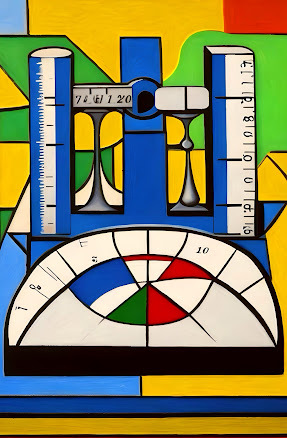 “The culture of relativism is the same disorder which drives one person to take advantage of another, to treat others as mere objects, imposing forced labour on them or enslaving them to pay their debts. The same kind of thinking leads to the sexual exploitation of children and abandonment of the elderly who no longer serve our interests. It is also the mindset of those who say: Let us allow the invisible forces of the market to regulate the economy, and consider their impact on society and nature as collateral damage. In the absence of objective truths or sound principles other than the satisfaction of our own desires and immediate needs, what limits can be placed on human trafficking, organized crime, the drug trade, commerce in blood diamonds and the fur of endangered species? Is it not the same relativistic logic which justifies buying the organs of the poor for resale or use in experimentation, or eliminating children because they are not what their parents wanted? This same “use and throw away” logic generates so much waste, because of the disordered desire to consume more than what is really necessary. “We should not think that political efforts or the force of law will be sufficient to prevent actions which affect the environment because, when the culture itself is corrupt and objective truth and universally valid principles are no longer upheld, then laws can only be seen as arbitrary impositions or obstacles to be avoided.”.
“The culture of relativism is the same disorder which drives one person to take advantage of another, to treat others as mere objects, imposing forced labour on them or enslaving them to pay their debts. The same kind of thinking leads to the sexual exploitation of children and abandonment of the elderly who no longer serve our interests. It is also the mindset of those who say: Let us allow the invisible forces of the market to regulate the economy, and consider their impact on society and nature as collateral damage. In the absence of objective truths or sound principles other than the satisfaction of our own desires and immediate needs, what limits can be placed on human trafficking, organized crime, the drug trade, commerce in blood diamonds and the fur of endangered species? Is it not the same relativistic logic which justifies buying the organs of the poor for resale or use in experimentation, or eliminating children because they are not what their parents wanted? This same “use and throw away” logic generates so much waste, because of the disordered desire to consume more than what is really necessary. “We should not think that political efforts or the force of law will be sufficient to prevent actions which affect the environment because, when the culture itself is corrupt and objective truth and universally valid principles are no longer upheld, then laws can only be seen as arbitrary impositions or obstacles to be avoided.”.~Pope Francis, Laudato Si 123
June 25, 2024
“June Moon”
I worked this piece from a recently-taken photo of the moon climbing the twilight sky after 9:00 PM. It’s a “virtual design” (sometimes it feels more like sculpting-from-a-distance rather than painting because the tools are so diverse and I do lots of shaping and moving things around). It is not the result of “AI Roulette”—I have been working with Digital Art for over a decade. These pictures (beginning with my own photos) take time and sometimes too much work.
A kind of “sense of direction” develops as I select photos and try different digital techniques. It’s a process of using digital “materials” to make a work that embodies a creative intuition. (And, in the philosophical sense, the light and colors that are effected by all that underlying computer programming still constitute matter. They aren’t “spirit”! They are material elements that can be shaped into creative configurations that aspire to express the awareness of beauty.
So here is “June Moon” by JJ, made in JJStudios.

June 24, 2024
Saint John the Baptist
John the Baptist is my patron saint (although, since I was born in January 1963, I was also named for the current Pope of the time, who is now known as Saint John XXIII — so I figure that I “picked him up” as another patron when he was canonized in 2014☺️). But with Saint John the Baptist I get two feast days: his birth on June 24 and his martyrdom on August 29. Heaven knows I need the prayers….

June 23, 2024
Our Lives are a “History” that is Mysterious and Meaningful
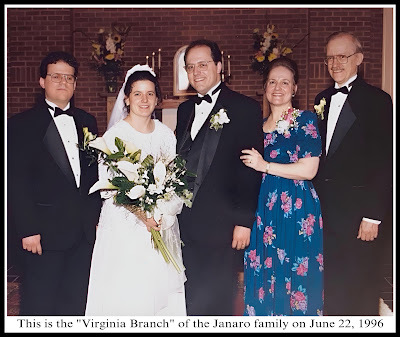 We did have a very happy anniversary in a simple way, full of so many memories—indeed, it was a different world in 1996. Our personal "world," in particular, has changed a lot. A local Janaro family picture on our wedding day was quite different from the most recent local family picture (from Anna’s baptism last December). I have posted the latter picture more than once recently. On the other hand, this 1996 picture—which dates from the pre-social-media era—is seldom seen unless we get out the “photo album” from our wedding (I have begun to scan these old pictures, but there are lots of them). One thing that strikes me this year is that my Dad was 61 years old and my Mom was 57 when we got married. And now, I am 61 and Eileen is 57.
We did have a very happy anniversary in a simple way, full of so many memories—indeed, it was a different world in 1996. Our personal "world," in particular, has changed a lot. A local Janaro family picture on our wedding day was quite different from the most recent local family picture (from Anna’s baptism last December). I have posted the latter picture more than once recently. On the other hand, this 1996 picture—which dates from the pre-social-media era—is seldom seen unless we get out the “photo album” from our wedding (I have begun to scan these old pictures, but there are lots of them). One thing that strikes me this year is that my Dad was 61 years old and my Mom was 57 when we got married. And now, I am 61 and Eileen is 57.The generations have shifted. Our “history” is moving forward.
So many people who were at our wedding have passed on. I miss those friends (including one of my groomsmen), most of the older generation of relatives that I knew since childhood, and especially my dear father and mother. They have completed the journey of this life, and have entered into the final and definitive encounter with the Mystery of God.
We no longer see them in this world and we miss them; sorrow is a profound part of being human. And yet, slowly with time, our sorrow begins to be changed, to open up beyond itself, to be turned into something like peace that even has hints of the flavor of joy.
Human life is historical, which means it changes. But we know that God has come to dwell with us, and He fills all history and our own lives, all the changes and losses (even those that are painful and overwhelming). He fills all of life with His promise, and He asks us to trust in Him.
Jesus is God-with-us, the center of the cosmos and of history. He stays with us in our own “histories of our lives,” takes our sins and sorrows and bears them Himself, and gives meaning to everything.
So we have a great hope that grows mysteriously (sometimes, it seems, “strangely”) with the passage of the years. We miss our loved ones, but we know that they remain in our lives—and not in a merely vague and hazy manner generated by our own mythopoetic reconstruction of our memories of the past. We remain together with them in Jesus Christ crucified and risen, glorified at the Father’s right hand, sending the Holy Spirit to transform us—Jesus present in His Church, present in a powerful way through the grace of the Sacrament of Marriage that marked our wedding day, 28 years ago, and that remains to this day as a fountain of grace that sustains our lives and our marriage.
Dear Jesus, thank You for everything. Grant that we may always remember You and adhere to You. Carry us both, in Your Mercy, to the fulfillment of Your eternal embrace, together with those who have gone before us, with those who are with us now (children and grandchildren), and with those yet to come—the generations of the future.
Our Lives are a “History” That is Mysterious and Meaningful
 We did have a very happy anniversary in a simple way, full of so many memories—indeed, it was a different world in 1996. Our personal world has changed a lot. A local Janaro family picture on our wedding day was quite different from the most recent local family picture (from Anna’s baptism last December). I have posted the latter picture more than once recently. On the other hand, this 1996 picture—which dates from the pre-social-media era—is seldom seen unless we get out the “photo album” from our wedding (I have begun to scan these old pictures, but there are lots of them). One thing that strikes me this year is that my Dad was 61 years old and my Mom was 57 when we got married. And now, I am 61 and Eileen is 57.
We did have a very happy anniversary in a simple way, full of so many memories—indeed, it was a different world in 1996. Our personal world has changed a lot. A local Janaro family picture on our wedding day was quite different from the most recent local family picture (from Anna’s baptism last December). I have posted the latter picture more than once recently. On the other hand, this 1996 picture—which dates from the pre-social-media era—is seldom seen unless we get out the “photo album” from our wedding (I have begun to scan these old pictures, but there are lots of them). One thing that strikes me this year is that my Dad was 61 years old and my Mom was 57 when we got married. And now, I am 61 and Eileen is 57.The generations have shifted. Our “history” is moving forward.
So many people who were at our wedding have passed on. I miss those friends (including one of my groomsmen), most of the older generation of relatives that I knew since childhood, and especially my dear father and mother. They have completed the journey of this life, and have entered into the final and definitive encounter with the Mystery of God.
We no longer see them in this world and we miss them; sorrow is a profound part of being human. And yet, slowly with time, our sorrow begins to be changed, to open up beyond itself, to be turned into something like peace that even has hints of the flavor of joy.
Human life is historical, which means it changes. But we know that God has come to dwell with us, and He fills all history and our own lives, all the changes and losses (even those that are painful and overwhelming). He fills all of life with His promise, and He asks us to trust in Him.
Jesus is God-with-us, the center of the cosmos and of history. He stays with us in our own “histories of our lives,” takes our sins and sorrows and bears them Himself, and gives meaning to everything.
So we have a great hope that grows mysteriously (sometimes, it seems, “strangely”) with the passage of the years. We miss our loved ones, but we know that they remain in our lives—and not in a merely vague and hazy manner generated by our own mythopoetic reconstruction of our memories of the past. We remain together with them in Jesus Christ crucified and risen, glorified at the Father’s right hand, sending the Holy Spirit to transform us—Jesus present in His Church, present in a powerful way through the grace of the Sacrament of Marriage that marked our wedding day, 28 years ago, and that remains to this day as a fountain of grace that sustains our lives and our marriage.
Dear Jesus, thank You for everything. Grant that we may always remember You and adhere to You. Carry us both, in Your Mercy, to the fulfillment of Your eternal embrace, together with those who have gone before us, with those who are with us now (children and grandchildren), and with those yet to come—the generations of the future.



